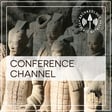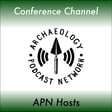Become a Creator today!Start creating today - Share your story with the world!
Start for free
00:00:00
00:00:01

069- EAA2019 - Mark Spanjer
These are selections of conversations recorded at the EAA2019 conference in Bern, Switzerland.
Tristan of the APN spoke to Mark Spanjer about the state of archaeology today.
Mark Spanjer talks about the relations that archaeologists have with one another and how we can make the profession better.
Recommended
Transcript
Archaeologists as Storytellers
00:00:00
Speaker
You're listening to the Archaeology Podcast Network. I kind of like the idea that archaeologists are the problem with archaeology, but without archaeologists, what is archaeology then?
00:00:14
Speaker
Well, to be totally blunt, the archaeologists are a part of the attraction. The archaeologists are a group of people who make different choices in life, engage with other matters, and in a sense we are, maybe we should go back to prehistory or even the Paleolithic, we are the ones in the group which tell stories and make connections
00:00:39
Speaker
So yes, we are indispensable part of the archaeology.
Innovation Challenges in Archaeology
00:00:43
Speaker
The attraction to archaeology is not only the stuff, not only stories, but the people, the interaction with the people who do these things.
00:00:52
Speaker
And we're kind of, I think maybe broadly you're trying to say that we're kind of, we find a rhythm and we find something that we think works and we're just repeating that and we're not really thinking outside the box. What's happening with archaeology? Well, what's happening with archaeology is essentially what is happening so many times before.
00:01:12
Speaker
you come to a situation you have success you embrace the success but then the success slowly slowly slowly becomes the usual and then the whole thing is how do you maintain the success and well do something new at the same time but that's risky.
00:01:30
Speaker
And it's the problem of being the first in industries, it's the problem of rearranging society and it works but then something comes
Breaking Molds and Facing Risks
00:01:42
Speaker
along. So it is a story which every human group in whatever form has encountered many times and we should be very aware of it.
00:01:50
Speaker
But that awareness is hampered by us being not so much the observers, but the absorbed matter. And therefore we are very much on the lines agreeing that we have a problem, but now someone has to break the mold.
00:02:07
Speaker
And we would like to see that someone else does it because of course breaking the mold is scary and it can get you ostracized, it can get you thrown out of the group, become a heretic or not accepted or not feeling part of the community.
00:02:26
Speaker
We are, in a sense, marginalized.
The Impact of Technology and Science
00:02:29
Speaker
The margins in commercial technology are not good. The amount of research at the universities are declining. There's a tendency to go to the hard sciences. So we sort of embrace what we have. But now the question is, how do we keep that and move along?
00:02:47
Speaker
We've talked briefly mentioning that the issues affecting one country's archaeologist seems to affect another, and you've kind of talked about European archaeology is very, there's a lot of continual issues throughout all of it. Why is archaeology, why is it replicating the same problems everywhere?
00:03:07
Speaker
What do you think? I think it is because in a sense it proves that archaeology is universal. Hooray! But it is also, archaeology is a subject matter which attracts a sort of people and they are very much kin.
00:03:24
Speaker
and they meet on a larger scale, mostly in Western societies who are organized and there are certain trends all over the world. So we are part of a very large story, and yeah, to recognize that, to give that a reason, but it is mostly done by looking
Psychological and Structural Challenges
00:03:44
Speaker
at ourselves. I think it would be very interesting to have a sort of a mass psychological, international study of archaeologists.
00:03:50
Speaker
What makes an archaeologist an archaeologist and it is probably his emotional needs, his linkage into the group.
00:04:03
Speaker
this curiosity and that kind of a personality brings about a sort of problems, they attract these sort of problems. And it's just in a sense what a psychologist tells you, that kind of a personality has a bigger chance to hit this kind of a problem.
00:04:23
Speaker
What do you think can be actually be done? Because we can sit and talk about it as individuals, about structural changes that need to change and need to change, but it feels like we're always having the same conversations.
00:04:35
Speaker
Well, it is funny and sad at the same time, because I was sitting in a session these days, and I was thinking, this is sort of what I was telling people at Malta, and that's 10, maybe nine years ago. And sometimes I feel tired, and sometimes I think this is hopeless.
00:05:00
Speaker
But you have to try. Somewhere someone will have this brilliant idea and will move on.
Ethics in Archaeological Education
00:05:05
Speaker
And we have to nurture all these people who are a bit on the fringes now and hope that they will give you, give us as a community a sense to break out. And another thing is, I tell my students at an early age,
00:05:22
Speaker
all these kinds of things. I think ethics and the social environment, bigger than archaeology, should be taught to all kinds of students. If you're a theoretical archaeologist or vocational archaeology, it doesn't matter. We should be much more aware of our role in society. Thank you very much.
00:05:37
Speaker
This has been a presentation of the Archaeology Podcast Network. Visit us on the web for show notes and other podcasts at www.archpodnet.com. Contact us at chrisatarchaeologypodcastnetwork.com.

